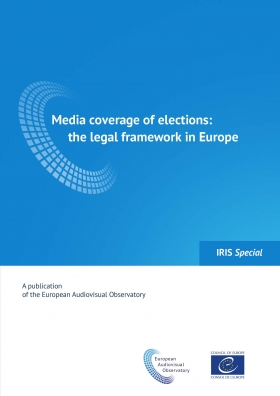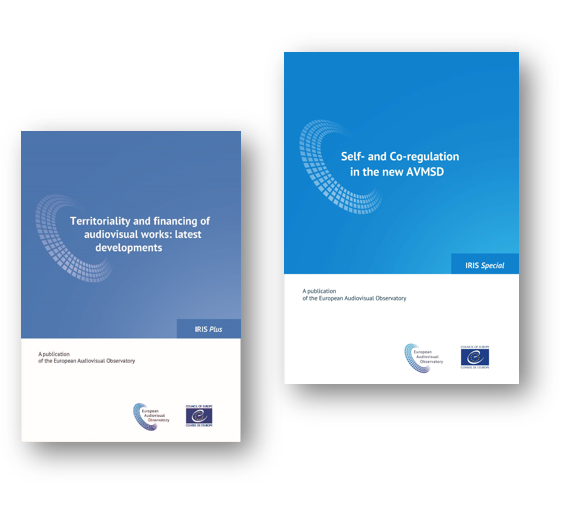IRIS Special

The themes covered are of direct practical relevance and are explored with academic rigour. The particular value of the IRIS Special series lies in its international approach or the comparison of different legal systems as the case may be. Recognised as a reliable source of information, the series has a track record of supplying both the audiovisual industry and also legislators and other decision makers at national and European level with highly useful data, overviews, ideas and analyses. The European Audiovisual Observatory publishes one or two IRIS Specials annually. Depending on their theme, they each contain 50-150 pages. In many cases, background material – standard-setting legal texts for example – is included.
- All published issues are available for free in PDF format (see below).
- Print versions for publications prior to 2022, may be purchased from the Council of Europe online shop.
IRIS Special 2019-2: Self- and co-regulation in the new AVMSD
This publication aims to analyse the system of self- and co-regulation provided for in the revised AVMSD.
IRIS Special 2019-1: The independence of media regulatory authorities in Europe
This IRIS Special aims to advance understanding of the ways in which the revised AVMSD may have an impact on current legislation and practices.
IRIS Special 2018-2: Media law enforcement without frontiers
This report provides an in-depth overview of relevant issues, from the challenges of law enforcement in the online environment to the scope of intervention of competent public bodies concerning cross-border activities and the practices of regulatory authorities.
IRIS Special 2018-1: Media reporting: facts, nothing but facts?
This report provides an overview of how the principles of accuracy, objectivity and fairness in news and current affairs reporting are regulated at European and national level, as well as how they are applied by European media organisations.
IRIS Special 2017-2: Journalism and media privilege
The report provides an overview of the most recent rules, case law and policies across Europe with regard to the privileges that are given to journalists when exercising their activities.
IRIS Special 2017-1: Media coverage of elections: the legal framework in Europe
This report provides an overview of the most recent rules, case-law and policies across Europe with regard to the coverage of elections and referenda in the various media. Looking into broadcasting and print media, as well as the online dimension, it gives an insight into the differing degrees of...
IRIS Special 2016-2: Media ownership - Market realities and regulatory responses
One of the pillars of freedom of expression in the audiovisual sector is media pluralism. This concept covers, on the one hand, the availability of a variety of choice in the programming of the different media players. On the other hand, it concerns the effective presence of a multitude of...
IRIS Special 2016-1: Regional and local broadcasting in Europe
Already when considering the strong differences across the various institutional systems across Europe, the word region” does not have one and only meaning. This is even more true when speaking about media, which do not necessarily reflect administrative structures, but rather give voice to the...
IRIS Special 2015-2: Smart TV and data protection
A man walks through a shopping centre. His eyes are flashed by a multitude of cameras equipped with eye-recognition software. Immediately the shop windows start to show on flashy screens advertising specially tailored to him.
IRIS Special 2015-1: Online activities of public service media: remit and financing
This report tackles issues such as the definition of a public service media, current funding models for broadcasting or indeed the pertinence and practicability of a public value test for New Media services of public service media.
